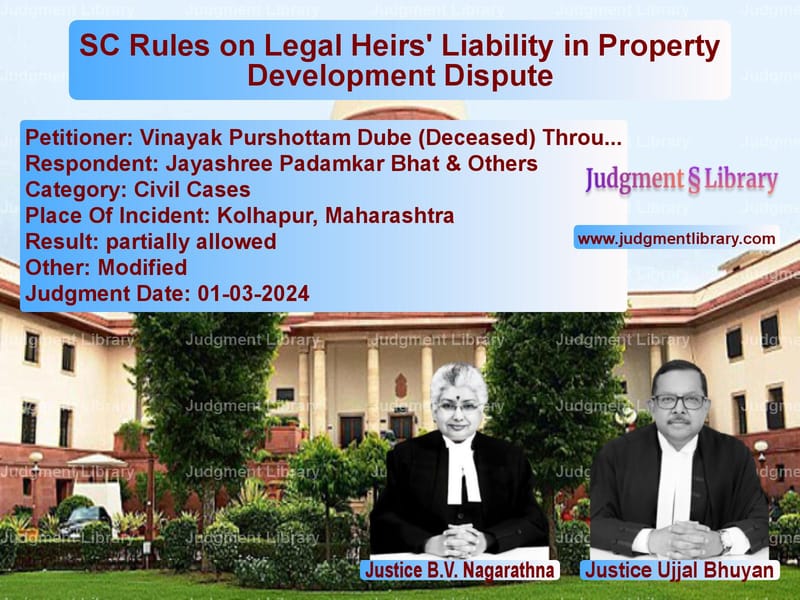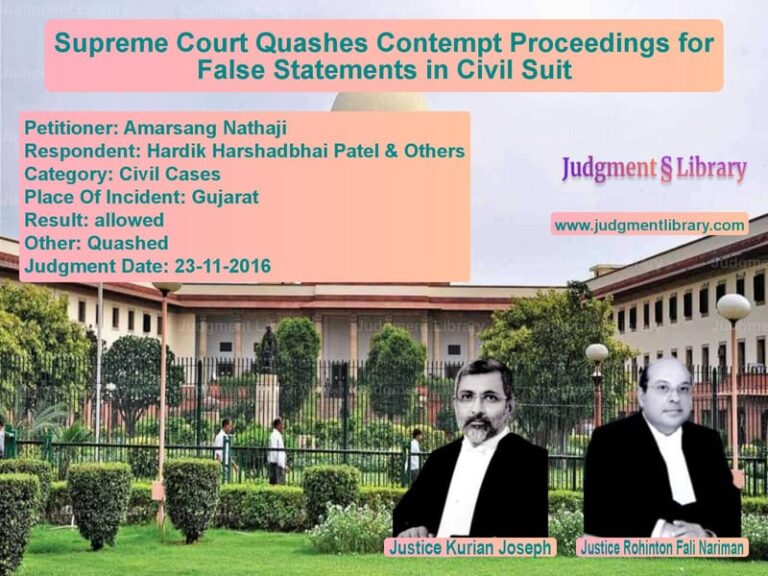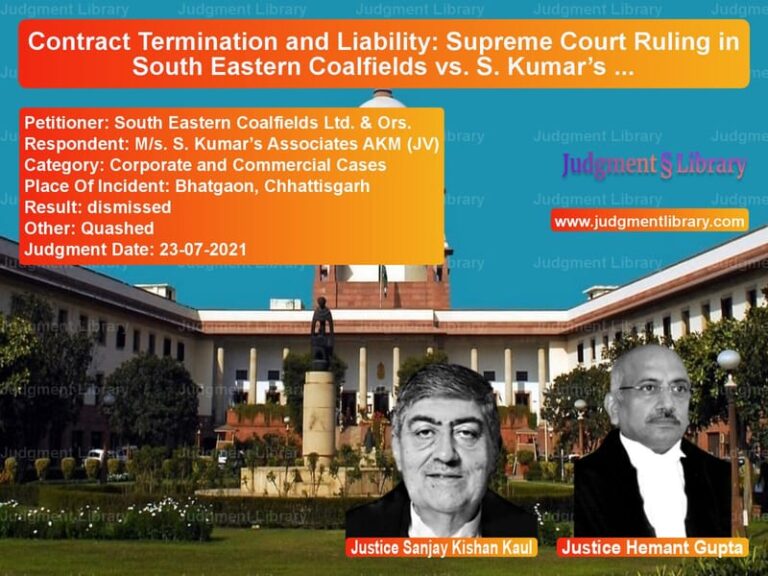SC Rules on Legal Heirs’ Liability in Property Development Dispute
The Supreme Court of India recently decided a crucial case regarding the liability of legal heirs in fulfilling contractual obligations of a deceased individual in the real estate sector. The case, Vinayak Purshottam Dube (Deceased) Through LRs vs. Jayashree Padamkar Bhat & Others, addressed whether the legal representatives of a deceased property developer could be held accountable for both financial liabilities and the completion of construction-related obligations agreed upon in a development agreement.
The case was initially heard by the District Consumer Forum, followed by the Maharashtra State Consumer Commission, and later, the National Consumer Disputes Redressal Commission (NCDRC). The Supreme Court’s ruling has significant implications for the legal responsibilities of legal heirs in proprietary business arrangements.
Background of the Case
The dispute arose from a Development Agreement dated July 30, 1996, between the complainants (Jayashree Padmakar Bhat and others) and the original opposite party (Vinayak Purshottam Dube), a sole proprietor developer. Under this agreement:
- The complainants were entitled to receive eight residential flats and ₹6,50,000 as consideration for their property.
- The developer allegedly failed to make the complete payment and deviated from the sanctioned building plan.
- Unauthorized constructions were made, some of which were sold to third parties.
- Construction defects, such as cracks in the building, incomplete terrace work, and lack of electricity meters, were reported.
Due to these alleged breaches, the complainants approached the District Consumer Forum, seeking compensation, rectification of construction defects, and completion of pending work. The opposite party denied the allegations, claiming that the complainants owed the developer ₹8,60,000 for construction and amenities.
Legal Proceedings
District Consumer Forum Decision
On October 16, 2006, the District Forum ruled that:
- The dispute was covered under consumer protection laws as it involved construction services.
- The opposite party was liable to pay ₹1,65,000 with 18% interest from May 1, 1997, ₹1,85,000 with 18% interest from August 31, 1997, and ₹1,50,000 at the time of conveyance.
- There was insufficient evidence to prove construction defects.
State Commission Decision
The Maharashtra State Consumer Commission modified the District Forum’s order:
- The claims of ₹1.65 lakh and ₹1.85 lakh were deemed time-barred and set aside.
- The direction to pay ₹1.5 lakh was upheld.
- The developer was ordered to complete construction of the compound wall, provide separate access, obtain the Completion Certificate, execute the Conveyance Deed, and provide electricity connections to the complainants.
NCDRC Decision
In May 2016, the NCDRC reinstated the time-barred claims, ruling that there was a continuous cause of action. It upheld the State Commission’s directives regarding completion of construction work and other obligations.
Supreme Court Decision
The legal representatives of the deceased developer challenged the NCDRC’s ruling before the Supreme Court, arguing that they should not be held personally liable for construction-related obligations.
Key Legal Issues Considered
1. Are Legal Heirs Liable for a Deceased Developer’s Contractual Obligations?
The Supreme Court examined whether legal heirs inherit not just financial liabilities but also performance-related obligations of the deceased.
2. Does the Nature of a Proprietary Business Affect the Legal Heirs’ Liability?
Since the developer operated as a sole proprietor, the Court considered whether his legal heirs could be required to complete pending construction work.
3. Can Legal Heirs Be Forced to Undertake Skilled Work?
The Court analyzed whether obligations requiring specialized skills, such as construction, could be imposed on heirs who lacked expertise.
Supreme Court’s Observations
1. Legal Heirs Cannot Be Forced to Perform Personal Obligations
The Court ruled that while monetary liabilities can pass to legal representatives, obligations requiring personal skill and expertise cannot:
“A contract involving exercise of an individual’s skills or expertise, or one that depends on personal qualifications, cannot be enforced against legal heirs upon the promisor’s demise.”
2. Estate of the Deceased is Liable for Monetary Claims
The Court held that the financial obligations imposed by the District Forum must be fulfilled from the deceased’s estate:
“The legal representatives are liable only to the extent of the estate inherited and cannot be held personally accountable beyond that.”
3. Proprietary Business is Not a Separate Legal Entity
The Court emphasized that a sole proprietorship ceases to exist upon the proprietor’s death:
“A proprietary concern is not distinct from its owner. Upon the owner’s death, contractual obligations requiring personal skills cannot be transferred to heirs.”
4. Judicial Precedents Support Limited Liability of Legal Heirs
The Court cited various precedents, including Raghu Lakshminarayanan vs. Fine Tubes, which clarified that a proprietary concern does not have a separate legal existence.
Final Verdict
The Supreme Court ruled:
- The legal representatives must pay ₹1.65 lakh and ₹1.85 lakh along with interest from the estate of the deceased.
- The legal heirs are not required to undertake construction work or fulfill other non-monetary obligations.
- The orders of the NCDRC, State Commission, and District Forum regarding non-monetary obligations were set aside.
Key Takeaways
- Financial obligations survive death: Monetary liabilities of a deceased person’s business can be enforced against their estate.
- Personal obligations do not transfer: Tasks requiring personal skill, such as construction, cannot be imposed on legal heirs.
- Sole proprietorships end with the owner: Unlike companies, sole proprietorships do not have a separate legal existence beyond the owner’s lifetime.
- Judicial protection for legal heirs: Heirs cannot be forced to undertake tasks beyond their capacity or expertise.
This ruling provides clarity on the legal responsibilities of heirs in business-related disputes, reinforcing the principle that personal obligations do not extend beyond the lifetime of the promisor.
Petitioner Name: Vinayak Purshottam Dube (Deceased) Through LRs.Respondent Name: Jayashree Padamkar Bhat & Others.Judgment By: Justice B.V. Nagarathna, Justice Ujjal Bhuyan.Place Of Incident: Kolhapur, Maharashtra.Judgment Date: 01-03-2024.
Don’t miss out on the full details! Download the complete judgment in PDF format below and gain valuable insights instantly!
Download Judgment: vinayak-purshottam-d-vs-jayashree-padamkar-b-supreme-court-of-india-judgment-dated-01-03-2024.pdf
Directly Download Judgment: Directly download this Judgment
See all petitions in Contract Disputes
See all petitions in Property Disputes
See all petitions in Judgment by B.V. Nagarathna
See all petitions in Judgment by Ujjal Bhuyan
See all petitions in partially allowed
See all petitions in Modified
See all petitions in supreme court of India judgments March 2024
See all petitions in 2024 judgments
See all posts in Civil Cases Category
See all allowed petitions in Civil Cases Category
See all Dismissed petitions in Civil Cases Category
See all partially allowed petitions in Civil Cases Category







